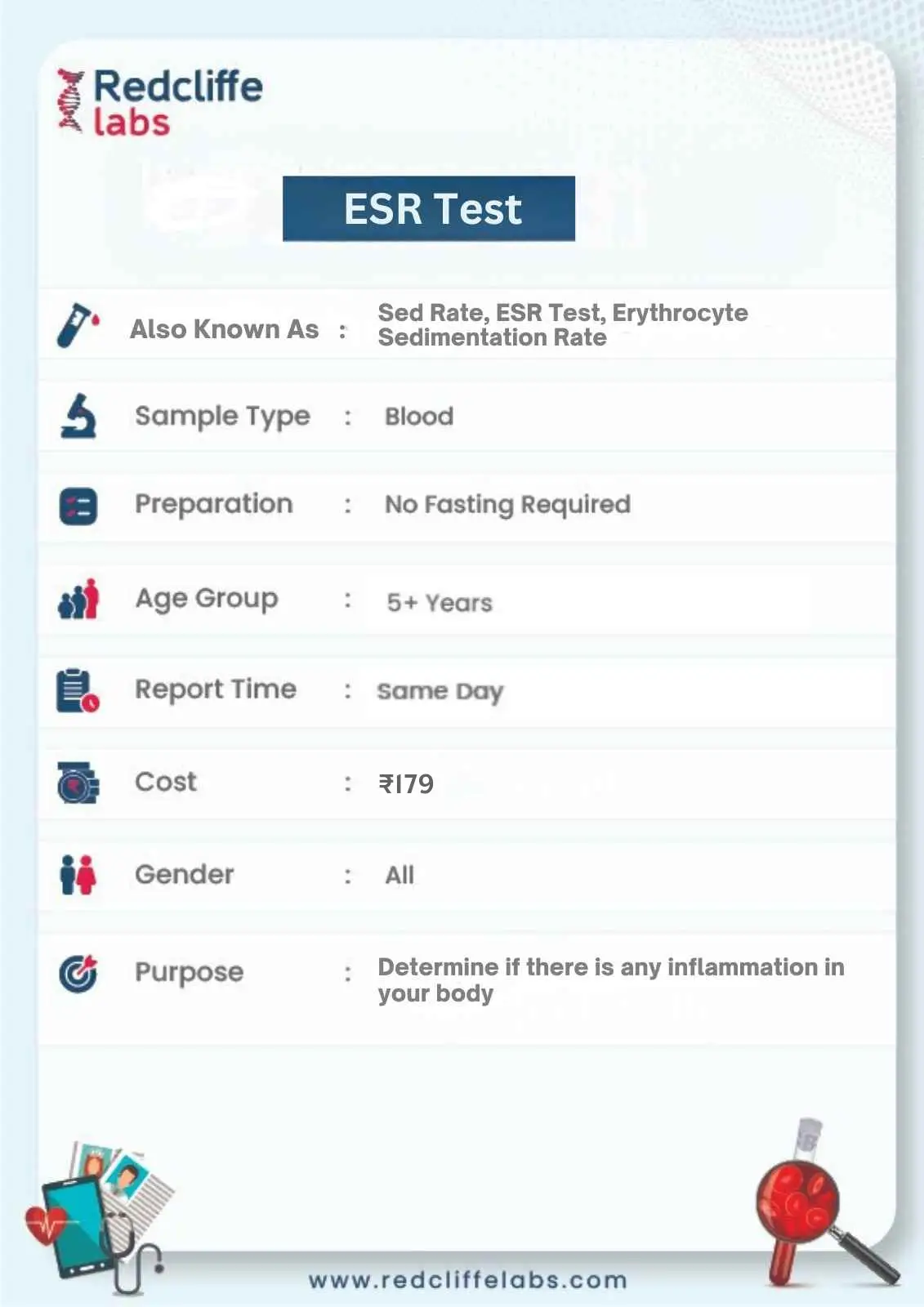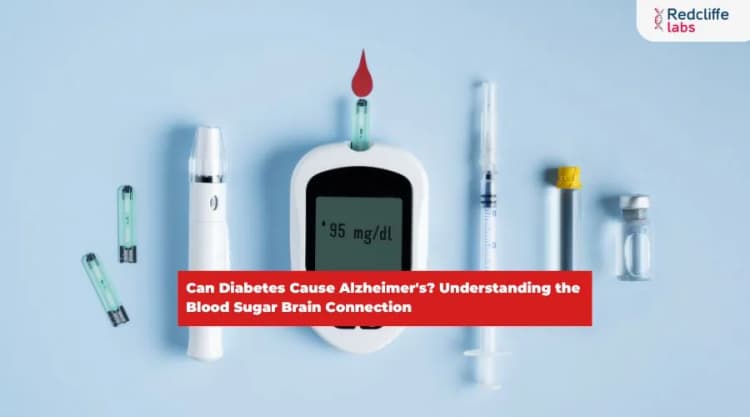The Erythrocyte Sedimentation Rate (ESR) Test measur...Read more
Blood
Unlock special
discount on
this package
Login to Unlock 🔓
Also Known As
Sed Rate, ESR, Erythrocyte Sedimentation RateNABL M(EL)T Certified lab*

Booking Benefits Unlocked Worth FREE 799

Report Consultation

Diet Plan
*Available once your report is generated.
At Redcliffe Labs, we have a single goal: to give India its right to quality diagnostics.
Customers served
Tests Processed Everyday
Cities
Collection Centres
World Class In-house Labs
Home Collection Experts
1 Test Parameters
Erythrocyte Sedimentation Rate (ESR)
1 PARAMETER INCLUDED
1 PARAMETER INCLUDED
- ESR (Erythrocyte Sedimentation Rate)
Helps you know your test better
Who all are eligible for ESR test?
- A doctor may recommend this test if you have such symptoms. Neck, pelvis, or shoulder pain, loss of appetite, drastic weight loss without any effort, headache, joint pain, stiffness, and swelling.
- In the case of some infections: Rheumatic fever, infection in heart valves, bones, and skin, tuberculosis infection, arthritis, lupus, and IBD (inflammatory bowel disease).
Why take ESR test?
- This test detects infections and its severity is related to viruses or bacteria. The ESR test is used in combination with other tests to determine the cause and specific location of infection, especially in polymyalgia rheumatica and inflammation of the arteries.
- It is a test that helps check for the presence of a disease, infection, or condition in the body that may be causing inflammation.
What are the benefits of ESR test?
- The test determines several medical illnesses, including IB, vasculitis, arthritis, and others as mentioned above.
- It is also helpful in monitoring the current state of illness.
- It helps doctors to know how the treatment is working and the body’s response to the treatment.
Top Booked Health Checkup Packages
Reports in 8 hours
|Parameters 94
Reports in 8 hours
|Parameters 96
Reports in 8 hours
|Parameters 89
Reports in 8 hours
|Parameters 96
Reports in 9 hours
|Parameters 90
Helps you know your test better
Q. How can I book my test?
Q. In how much time will I get my test report?
Q. Where can I see or get my test results?
Q. Is home sample collection available for ESR test?
Verified by Medical Expert

WRITTEN BY
Komal Daryani

MEDICALLY REVIEWED BY
Dr. Mayanka Seth

ESR Blood Test in Darbhanga
About ESR test
Doctors advise analysing the blood for a range of markers to detect inflammation in the body. The erythrocyte sedimentation rate (ESR) is one such measure. It is a blood test that can detect any inflammatory activity in the body. It is not a single conclusive test to determine the site or cause of the inflammation. Still, it can aid in diagnosing and monitoring inflammation throughout the body.
What is erythrocyte sedimentation rate, and how does the test work?
The test is also known as sedimentation test or sed rate test, because it examines how quickly the RBC settles to the bottom of a collection tube.
The test is carried out for a period of time, with the blood sample being measured over an hour or so.
When the body is inflamed, it has a wide range of detrimental impacts on several functions and organs. The inflammatory process in the body has a unique effect on red blood cells or erythrocytes. RBC clumping can occur as a result of inflammation.
RBC does not usually sink to the bottom quickly. When they cluster together in a typical situation, the sedimentation rate rises. In the case of acute and chronic inflammation, RBCs may have more protein, which may cause them to settle faster towards the bottom of the tube. The higher the degree of inflammation, the faster the RBC falls to the bottom.
What are the two main types of ESR blood tests?
There are two approaches for calculating the actual erythrocyte sedimentation rate.
- The Westergren method is the most often used procedure for testing the erythrocyte sedimentation rate. The procedure begins with blood drawn into a Westergren Katz tube and continues until the blood level reaches 200 mm. After that, the tube is stored upright at room temperature for 60 minutes. The test evaluates the gap between the tip of the blood mixture and the top of RBC sedimentation.
- The Wintrobe method is similar to the Westergren method, the difference being the tubes used in both procedures. While it is a 100 mm tube for the Wintrobe method, it is a 200 mm tube for the Westergren method. This method is popular, but one significant disadvantage is that it is less sensitive than the Westergren method. So the Westergren method is given more priority.
What is the purpose of the ESR Test?
Here is the purpose of the ESR blood Test-
- Diagnosis—The test helps to identify the cause of patient symptoms. Many health conditions can cause abnormal ESR levels, so the test is often combined with other tests to diagnose infections, blood disorders, kidney disease, and other health issues.
- Monitoring—The test also helps to assess a patient's health after diagnosis. An ESR test is used to identify inflammatory health conditions and evaluate the patient's response to treatment for certain disorders.
What does the ESR Test measure?
The ESR test measures how fast RBCs fall to the bottom of the test tube. The rate at which these cells fall is called the sedimentation rate, measured in millimeters per hour (mm/h).
Why does one need to undergo an ESR test in Darbhanga?
A person needs a test in case they display symptoms of underlying infection in the body like:
- Excessive headache, which is persistent. The inflammatory responses in the body can give rise to headaches that affect the temples and cause vision changes.
- Fever: Constantly high fever of 104°F or above
- Sudden weight loss
- Stiffness in the joints that leads to pain and restriction in mobility
- Shoulder and neck pain: Underlying inflammation can also give rise to excessive neck and shoulder pain, increasing with each passing day.
- Loss of appetite
- Anaemia: Low levels of haemoglobin in the blood.
- Diarrhoea
- Abdominal pain
Because the erythrocyte sedimentation test cannot diagnose a problem on its own, it is usually combined with a complete blood haemogram and a CRP test, to provide a complete picture of the body’s inflammatory reactions.
Why is the ESR test used?
Doctors typically prescribe ESR blood testing to discover and diagnose unexplained symptoms, such as fever, arthritis or a muscular issue. An ESR test can frequently aid in the confirmation of a diagnosis of certain diseases, including:
- Giant cell arteritis
- Temporal arteritis
- Polymyalgia rheumatica
- Rheumatoid arthritis
- Autoimmune diseases
- Cancers
- Infections
Many autoimmune disorders can cause inflammation in the body. In such circumstances, the test serves as a diagnostic tool.
Once the disease has been diagnosed, a standard ESR test can be included in the usual process to see whether or not the treatment offered is effective or helpful. Understanding the sedimentation rate test also aids in determining the severity of the underlying inflammation and how to properly monitor the therapy. A low sedimentation rate may suggest that the treatment is effective.
What preparation is required for the ESR Test?
You don't need any special preparation before the ESR Test. Here are simple guidelines you must follow before taking the test-
- Fasting- No fasting is necessary before the ESR blood test. You can eat and drink as usual.
- Medications or supplements- If you take any medicines or supplements, consult your doctor, as some might interfere with your ESR levels.
- Hydration—You can drink water before the test. Staying hydrated ensures a smooth blood flow.
Consult your doctor—If you have any doubts about the procedure or anything else, discuss them with your doctor before going for the test.
What is the procedure for the ESR test?
An erythrocyte sedimentation rate test is a painless and straightforward technique. Our skilled phlebotomists will take care of everything after you arrange a test with us at the Redcliffe Labs. As it is a blood test, the first step involves collecting blood samples from an upper arm vein.
- The skin over the vein is cleaned first with antiseptic.
- An elastic band is then placed on top of the arm to apply slight pressure, making a drawing of blood easier.
- The phlebo then inserts a needle and draws blood.
- After pulling out of the needle, the area is covered, and pressure is administered to relieve the discomfort and excess blood.
The sample is adequately stored before being sent to the lab for testing. It is placed in a sedimentation tube, which remains for an hour. The test will help determine the pace at which the RBC sinks to the bottom of the tube. The test also determines how many RBCs sink. Because inflammation can cause RBCs to clump together and the presence of aberrant proteins, both of these factors can accelerate sedimentation.
ESR Blood Test Price in Darbhanga
| Name Of The Test | ESR Test in Darbhanga |
| Sample Type | Blood |
| Number Of Tests | 1 |
| Actual Test Price | Rs. 199 |
| Discounted Test Price | Rs. 179 |
| Home Sample Collection | Available |
| Additional Cost For Home Sample Collection | Applicable |
| Fasting Before Test | Not Required |
| Get Reports Within | Same Day |

The ESR blood test price in Darbhanga is often low, and the testing facility and its services mainly determine it. The ESR test price can increase due to the diagnostic facility’s advanced labs, accreditations and many other services. An FDA-approved, high-tech laboratory with a reputation for providing accurate results, will have a substantially higher cost, but you will be assured of quality. The ESR test cost in Darbhanga at Redcliffe is INR 179. While booking your test, you can avail of several discounts on our website and save money.
Other ESR Related Tests/Packages That You Can Book With Redcliffe Labs
| Tests/Packages | Price in INR |
| Haemogram Test | ₹449 |
| Vital Screening Package | ₹799 |
| Smart Full Body Checkup | ₹999 |
| Fever Package - Essential | ₹799 |
| Fit India Full Body Checkup | ₹1249 |
| Smart Full Body Check up with Vitamin D | ₹1399 |
| Swasth Bharat Full Body Checkup with Vitamin screening | ₹1799 |
| Advance Plus Full Body Checkup | ₹2499 |
How to analyse the results of the ESR test?
ESR test results are frequently expressed in millimetres per hour (mm/hr). The greater the number, the more likely inflammation is. The average ESR count is as follows:
|
Normal levels of ESR |
Abnormal levels of ESR |
Values |
|
Females under 50 |
Between 0 and 20 mm/hr. |
Greater than 20 |
|
Males under 50 |
Between 0 and 15 mm/hr. |
Greater than 15 |
|
Females over 50 |
Between 0 and 30 mm/hr |
Greater than 30 |
People with low ESR values can have conditions like:
- Sickle cell anaemia: where the shape of RBC is altered and they become sickle-shaped.
- Leukaemia: blood cancer.
- High RBC count
- Reduced levels of the protein fibrinogen
- Blood becomes hyper viscous: the thickness of the blood increases.
- The high number of white blood cells in the blood.
- Increased chances of congestive heart failure.
When people have moderately elevated levels of ESR, It may or may not be an indicator of any health condition.
Moderately elevated levels can be seen generally in many cases, but they can also indicate the following conditions:
- Rheumatoid arthritis
- Anaemia: where there is a decrease in the number of red blood cell
- kidney disorders
- cancer like lymphoma
- Tuberculosis
- any infection of the bone
- thyroid disorders
- abnormalities in the red blood cell-like macrocytosis
Very high levels of ESR: extremely high levels of ESR are observed where the levels are above 100 mm per hour. These are indicators of very severe conditions like:
- Temporal arteritis, also known as polymyalgia rheumatica
- Hypersensitivity vasculitis: this is a condition where the body reacts excessively against any Allergan and leads to severe inflammation of blood vessel
- Plasma cell cancer or multiple myeloma.
- Cancer of white blood cell: Waldenstrom’s macroglobulinemia.
5 Simple Steps to Manage Your Health with Redcliffe Labs
Quick, Simple & Convenient; trusted care delivered to your doorstep.

Start Your Online Booking
Open the Redcliffe Labs website/app. Select the test or package and enter your details. Schedule the service for your preferred slot.

Live Tracking
Stay updated with real-time tracking for a smooth and timely home sample collection.

Sample Collection
Our certified experts ensure a smooth, hygienic, and fully compliant sample collection experience.

Doctor-Verified Smart Reports
Every report is clinically checked by expert doctors and shared with smart, actionable insights.

Your Health Journey Continues Post Reports
Consult with our expert medical team to get actionable insights to improve your health.
Nearby Labs(9)
Redcliffe Labs Darbhanga
Redcliffe Collection Center
Redcliffe Collection Center
Redcliffe Collection Center
Redcliffe Collection Center
Redcliffe Collection Center
Redcliffe Collection Center
Redcliffe Collection Center
Redcliffe Collection Center
Frequently Asked Questions
Why ESR Blood test is Done?
Why do doctors ask for ESR Test?
What does ESR Test show?
What causes raised ESR?
Is high ESR good or bad?
What are the risks involved with the ESR test?
Do I need to take special precautions before the ESR test?
Can I get a medical consultation at Redcliffe Labs?
When will I receive my reports?
Can I book a ESR Test near me in Darbhanga?
Can I book a home collection for a ESR Test in Darbhanga?
Health Articles & Blogs
My Health
Stay informed with our expert health articles and blogs. Explore comprehensive guides on diseases, nutrition, preventive care, and wellness tips to help you make better health decisions.
Can Exercise Really Treat Depression? What Research Says
Discover what research says about exercise and depression. Learn how physical activity may improve mood, reduce symptoms, and support mental health.

Is It Good to Eat Dried Cranberries Every Day? Benefits & Risks
Discover the health benefits and potential risks of eating dried cranberries every day, including sugar levels and portion tips.

7 Health Screenings Every Woman Above 30 Should Get Done Annually

Fat vs Muscle: Are they Different?

Can Managing High Blood Pressure Lower Uterine Fibroid Risk?

Debunking Epilepsy Myths: What Everyone Should Know

Can Diabetes Cause Alzheimer's? Understanding the Blood Sugar Brain Connection
Explore the link between diabetes and Alzheimer’s disease. Learn how high blood sugar may affect brain health, memory, and long-term cognitive function.

Pimples on Scalp: Causes, Treatments, and Prevention Tips
Explore My Health
